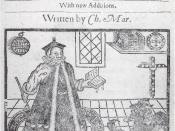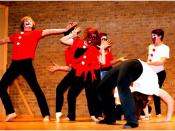In this essay I will be comparing and contrasting the theme of temptation and the tempter (sin/error) and downfall (the consequences of sin/error) presented in the narratives Dr Faustus and Othello. In both narratives the protrayal of the tempter is not so much of an evil decietful villain, but infact seems to be the representation or manifestation of the heroes supressed thoughts, in Othello's case; his insecurities. In a sense the villians represent a bit of doppleganger versions of the tragic heroes. The temptation is epitomized as willful self dellusion or self deception leading our heroes to self destruction. Thanatos, the death wish, is given sublime as well as catastrophic insinuations. The tempter simply seems to give voice or words to the thoughts or insecurities which are already present (just beneath the suface) in the heroes minds and hearts. Both Mephistophilis and Iago seem to make manifest that which is already latent in Dr Faustus and Othello respectively.
There is no substantial deciet involved, no glamour as such, they both make their choices with their eyes open.
While both narratives successfully manage to portray social and cultural concepts to the audience, Marlowe's Dr Faustus has more of a liberal context even though it is male dominated (that is our tragic hero is male) and Shakespeare's Othello is clearly evident of radicalism in his time of writing. Both Dr Faustus and Othello follow generic conventions, especially when it comes to depicting the moral of the story. In this essay I will elaborate at length on two of the main threads similar in both narratives 1) the pride and self image that leads our heroes to surrender themselves to temptation and sin, and 2) the consequences of the actions taken, in particular the outcome of yielding to temptation and sin.
Dr Faustus...


